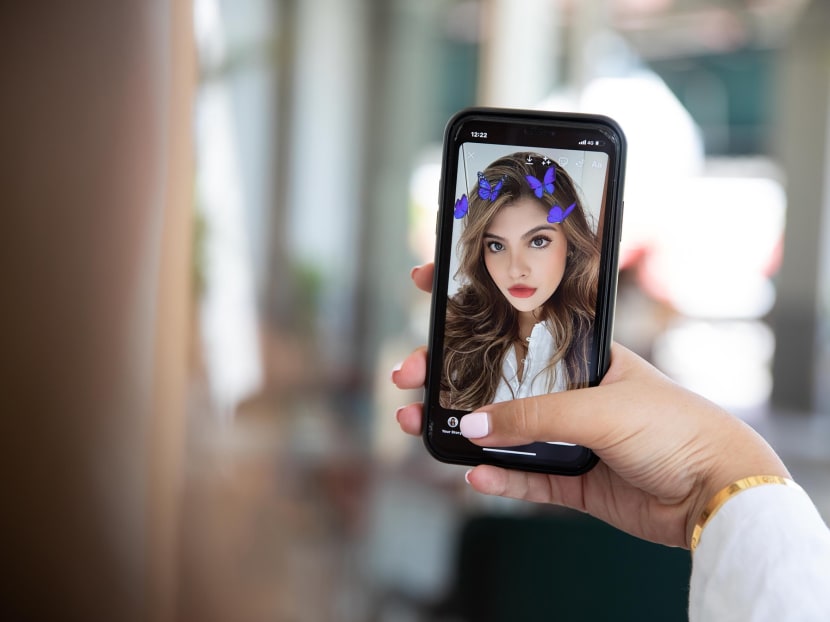Adulting 101: After growing up on social media, I’m learning to deal with unrealistic standards of beauty and success
SINGAPORE — One night last month, as I scrolled through my social media feeds before bed, toggling between Instagram, YouTube, Twitter and TikTok as I usually do, I realised I could no longer ignore the suffocating feeling that had been creeping over me.

Instagram filters allow a user to add effects to photos and selfies to change the way the person looks — a tool that can be detrimental to the mental wellbeing of a person who becomes obsessed with it.
Adulthood is an invigorating stage of life as young people join the workforce, take on more responsibilities and set their sights on the future. But its many facets — from managing finances and buying a home to achieving work-life balance — can be overwhelming.
In this series, TODAY’s journalists help young Singaporeans navigate this stage of their lives and learn something themselves in the process.
SINGAPORE — One night last month, as I scrolled through my social media feeds before bed, toggling between Instagram, YouTube, Twitter and TikTok as I usually do, I realised I could no longer ignore the suffocating feeling that had been creeping over me.
I chucked my phone aside and shut my eyes as I tried to force myself to sleep, but the steady stream of negative thoughts left me restless.
“Am I enough? Why am I not doing more? What am I even doing with my life? Why them and not me?” I questioned myself repeatedly, growing frustrated because I didn’t have the answers.
I’m not sure which was the last straw — the 20-year-old YouTuber who had just bought her second million-dollar home, or the TikTok star-turned-musician whose music video had just hit 200 million views on YouTube, when a few months ago she was leading an ordinary life just like you and me.
I had thought that by 25, I would have achieved more in life. While I have checked off some of the boxes of the “success sequence”, such as having graduated and securing a full-time job, I always thought that there would be something more.
This could be because I am a child of the internet. I spent my formative years on social media, creating my first Facebook account when I was 12 in 2008.
It was around the same time that YouTube success stories such as Justin Bieber began to break into mainstream pop culture. Over time, the number of such success stories has grown exponentially as I watched with envy.
It has always been ingrained in my mind that success is a result of hard work, but it’s hard to hold on to that belief when I began realising early on, thanks to such social media content, that luck also plays a huge role in one’s success. This leads to the question — why haven’t I been one of the lucky ones?
It also didn’t help that I grew up following reality TV shows that fed me false ideas about how adulthood will be filled with adventure and luxuries, that a jaw-dropping “glow up” would happen to me in my late teens and that I would have an extravagant marriage proposal to look forward to in my 20s.
These destructive messages are being compounded by a new crop of social media influencers who are younger than me and yet (seemingly) surpassing me in all facets of life. Sometimes I can’t help but feel like all my life’s accomplishments are nothing compared with what these internet people have achieved.
And so, often, I would hop on social media with the intention of unwinding after a long day at work, but find myself battling mounting anxiety as I scrolled.
There have even been times when I would deactivate my accounts because I was so fed up with my feelings of inadequacy. Sometimes, instead of deactivating, I would purge the list of influencers I followed so that my social media feeds would not show me posts from anyone who made me feel less than what I am worth.
And it is not just the successful and wealthy influencers who can trigger these feelings. It is no secret that Instagram gave birth to the widespread culture of image curation and continues to be the place where people showcase their seemingly perfect relationships, jet-setting lifestyles in lavish surroundings and fit, lithe bodies.
Instagram has even been blamed by critics for having created a new standard of conventional beauty — plump lips, chiselled cheekbones, a button nose and an hourglass figure — which many beauty influencers and model wannabes achieve through aesthetic procedures and surgery.
I often find myself staring at my reflection in the mirror at 2am, scrutinising my face from every angle, wondering if the nose clip I’ve been using religiously has been working, if the facial massages I give myself daily with a gua sha tool has sharpened my jawline and elongated my neck.
This is even though I am well aware that social media is a highlight reel — it shows only the best parts of people’s lives and few, if any, of the less-than-rosy parts.
Still, it’s hard to look away, especially now when social media has become even more of an escape route from dreary pandemic life.
NOT ALONE
When I shared these thoughts with my friends, I realised they had similar anxieties. The carefully curated, often false realities perpetuated by social media have created unrealistic ideals for many of us.
One friend told me about how she used to rely on face-altering filters, which has become a social media norm, to achieve a specific look. It eventually reached a point where she could not even accept how she looked without a filter, she said.
She had to take a step back, deactivating her account for a few weeks to reason with herself.
“I had to remind myself, ‘This is not how you look in real life so why would you put a fake brand out there?’,” she said. Now, she uses only a skin-smoothing filter on her photos that does not alter her features.
Another friend muted the Instagram stories and posts of people who were getting engaged or married while her own relationship was rocky. She also told me that she tries to only follow influencers whose lives she can relate to, and prefers influencers who are more "real" with their audiences.
Out of sight, out of mind, she advised me.
PUT YOUR PHONE DOWN
An expert I spoke to to help me navigate this issue, Mr John Shepherd Lim, Chief Wellbeing Officer of Singapore Counselling Centre, gave similar tips.
“If you find yourself unable to regulate negative emotions that arise from using social media or find it contributing to low self-esteem in the long term, consider taking a break or stepping away entirely, until you are in a better headspace to manage these thoughts,” he said.
He added that the time off social media could be used to focus on “building your perspective of your own self-worth”.
Dr Joel Yang, a clinical psychologist at Mind What Matters, said that removing influencers who do not add value to your personal or professional growth can be useful. He added that one should follow content that celebrates people’s work or passions, rather than the individual.
Mr Lim said it is important to keep in mind that people may post about their lives in a way that makes it look glamorous from the outside, “but we may not see the struggles they might have faced to get this far”.
He also said that one’s level of self-esteem affects the way we process the information we view online.
“It is inevitable to experience some level of unhappiness or discontent, but a person’s way of reconciling what they see online with how they view themselves is a process that differs from person to person, and eventually affects the degree to which social media alters their levels of self-acceptance and self-love.”
Mr Lim said that it is beneficial to reflect on one's own definition of success and “know that it is okay if your version of success doesn’t look like others”, adding that comparison can sometimes also be a useful tool to view others as inspirational role models.
“Understand your own values and hold onto them… live your life on your terms, celebrating what you are good at and accepting your true self.”
He added that individuals who think a lot about their body shape and size may feel less attractive and valued. This results in the occurrence of self-objectification, which is the act of linking self-worth to physical appearances.
Mr Lim advised online users to be mindful of fixations on imperfections.
“A common unhelpful thinking process is the disqualification of positives, and overgeneralisation of negatives, where we allow one flaw or negative comment to taint our entire perception of ourselves,” he said.
AM I TRAPPED?
I’ve come to realise that being mindful is only part of the cure.
While I have unfollowed or muted accounts that made me question my self-worth, the algorithms on these social media platforms seem to be working against my best efforts — they keep pushing me the kind of content I am consciously trying to avoid.
One morning earlier this week, as I opened the Twitter app, the first tweet I saw read: “Found out my coworker has his own business and makes about $27,000 a day. He's only at the job because of the benefits. He's 24.”
I do not follow the account of the person who tweeted this. It was a viral tweet that had been suggested to me by Twitter’s algorithm because I had interacted with such tweets in the past.
It seems like the algorithm has trapped me and I am considering starting on a clean slate altogether — deleting my accounts and starting over.
Perhaps this, coupled with the advice from the experts above, will help keep my anxieties in check.
For starters, I am going to regularly remind myself that I should focus on my own needs and happiness.
As Mr Lim said: “There is always going to be someone who will be better than you at something, but the one thing they can never be better at is being you. By accepting yourself for who you are, you can then become the best version of yourself.”
ABOUT THE WRITER:
Natasha Meah is a journalist at TODAY covering the health, education, community and finance beats.








